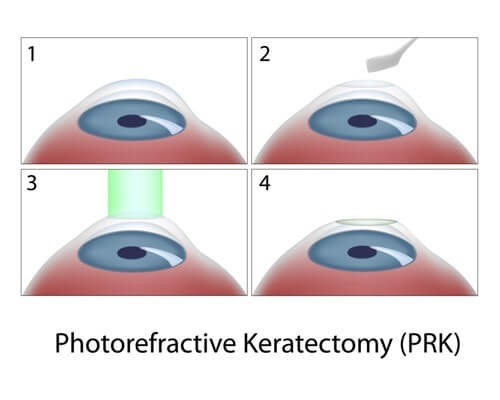PRK (Photo Refractive Keratectomy) Laser Eye Surgery Available in the Dallas and Fort Worth, Texas Area
PRK is an outpatient laser eye surgery procedure that is approved for treatment of a very wide range of nearsightedness (myopia), farsightedness (hyperopia), and astigmatism. PRK was the first refractive surgical procedure to utilize the excimer laser to change the curvature of the cornea to improve vision. PRK is the treatment of choice for patients with epithelial basement membrane disorder or recurrent erosions as well as other conditions such as corneal thickness wall issues or prior RK surgery. Tylock-George Eye Care and Laser Center offers PRK laser eye surgery to qualifying residents in the Dallas and Fort Worth, Texas region.
How is PRK Laser Eye Surgery Different than LASIK?
Computer-driven for accuracy and precision, PRK reshapes the surface of the cornea using beams of ultraviolet light from an excimer laser. PRK uses the same excimer laser as IntraLASIK, but the procedure is performed on the corneal surface rather than internally. Instead of creating a flap, as in IntraLASIK, the outer most layer of the cornea (epithelium) is removed and the laser is used on the surface corneal tissue. This microscopic re-shaping of the surface of the cornea improves the way light is focused or “refracted” by the eye.

PRK is performed using only eye drops for anesthesia. To assist healing after surgery, a clear bandage contact lens is placed over the cornea to make the patient more comfortable during the three to five days needed for the epithelium to re-grow. Additionally, PRK patients are normally placed on a regimen of steroid eye drops for a two to three month period, requiring monitoring by their doctor on a weekly or monthly basis. Like LASIK, PRK only takes about a minute per eye, with minimal discomfort. There is typically more discomfort during the healing process for PRK, and it takes a bit more time for the patient to see clearly, but the eventual outcome for LASIK and PRK is the same. Most patients are able to return to most normal daily activities two to three days following the PRK procedure, with best visual acuity achieved in approximately four to six weeks. To learn more about the PRK procedure, contact our laser eye care center near Dallas, Texas.
PRK for Epithelial Basement Membrane Disorder Case Information
Epithelial basement membrane disorder is a condition where the outer most layer of the cornea does not adhere well to the underlying corneal basement membrane. The most extreme form of this condition results in recurrent erosions, characterized by painful episodes where the surface epithelium spontaneously breaks off or detaches from the surface of the eye. These painful episodes may occur at night, awakening the patient from sleep, or during the day. PRK is the treatment of choice for these patients because it not only corrects the refractive error, but also repairs this inadequate corneal epithelial basement membrane adhesion giving a more stable, predictable refractive result. All patients having a PRK or other laser eye surgery evaluation at the Tylock-George Eye Care and Laser Center near Dallas, Texas are tested for basement membrane disorder.
To schedule your eye examination, contact our vision correction counselors in our Irving, Texas office today. Our phone number is (972)-210-0442. Call Today, See Better Tomorrow!








